When Will We Know What Mueller Knows? Maybe Never.
If there are charges of criminal wrongdoing, we'll definitely know. Otherwise, it all depends on how he sees his role.
Quinta Jurecic and Benjamin Wittes make the argument that whether and when we find out what Bob Mueller knows about the Trump-Russia investigation depends almost entirely on how he sees his role.
So far, Mueller has behaved like a traditional prosecutor. He has not made public statements beyond what he has argued in court. What the public has learned about his findings—at least what it has learned from Mueller’s shop—it has learned when he indicted people or reached plea agreements and facts emerged in the context of their prosecutions. This is the orthodox approach to federal prosecution. Prosecutors, after all, are not reporters. And federal investigations are not truth commissions. Remember the anger among many current and former federal prosecutors directed at then-FBI Director James Comey for announcing and discussing the evidence following his decision not to pursue charges in the Hillary Clinton email investigation. Normally, when prosecutors finish an investigation and don’t bring charges, they say nothing, and the evidence they have collected stays secret.
[…]
If Mueller follows the orthodox path—and the reaction to Comey’s behavior might well militate towards orthodoxy—we will only learn what Mueller knows if it produces indictments. We will learn about the extent of “collusion” or about possible obstructions of justice only to the extent his team concludes that the activity violated some federal criminal law and to the extent the team believes it can prove that violation beyond a reasonable doubt using admissible evidence. Short of that, the investigation will wind down and shut up and we’ll have to rely on congressional investigators, civil litigation, and historians for a narrative account of what actually happened. Those who were outraged by Comey’s disclosure and evaluation of the evidence in the Clinton matter should pause a moment to understand that this same behavior is precisely what they are now seeking from Mueller.
They note that there are other models and detail how incredibly differently Watergate Special Prosecutor Leon Jaworski and Whitewater-Lewinski Independent Counsel Ken Starr saw their jobs, with the former being incredibly secretive and the later famously detailed in what went public. Partly, that was a function of different underlying laws—Starr was essentially required to do what he did by Congress, although he did seem to take special pleasure in it—and partly personalities and the nature of the investigations.
They continue:
Neither of these reporting requirements remain in the regulations that govern Mueller, but neither do the relevant regulations preclude Mueller from behaving as Starr did. As we read the regulations, rather, Mueller can do any kind of reporting that he wants, provided that Rosenstein—who, by the way, worked for the Starr investigation once upon a time—is comfortable with his activity and the district court approves the release of any grand jury material. In other words, if Mueller has a truth-commission view of his role and Rosenstein tolerates it, a capacious report or set of reports, either to Congress or to the public, is certainly a possibility. It is neither required nor forbidden under the rules in force today.
And conclude:
To put the matter bluntly, it all boils down to how Mueller sees himself and his role. How does he? We have no idea. His history as a cautious and conservative actor—not to mention the outrage sparked by Starr and Comey’s more aggressive interpretations—would suggest a certain degree of orthodoxy. What’s more, his and his team’s utter silence outside the courtroom suggests a vision of the special counsel role narrowly focused on the work of investigation and prosecution to the exclusion of almost any public statements whatsoever.
Yet if any situation has ever begged for a truth-commission understanding of the role, L’Affaire Russe cries out for a capacious public reporting function. The questions it raises are sweeping and implicate not just presidential conduct but the integrity of an American presidential election. The question may boil down to how urgent Mueller feels the need is for Congress, or the public, to understand what happened—and also the extent to which he can play the needed public education role simply using the tools of the conventional prosecutor.
Of course, if Mueller and his team find actual criminal wrongdoing on the part of Trump and/or his campaign, we’ll certainly learn of that.
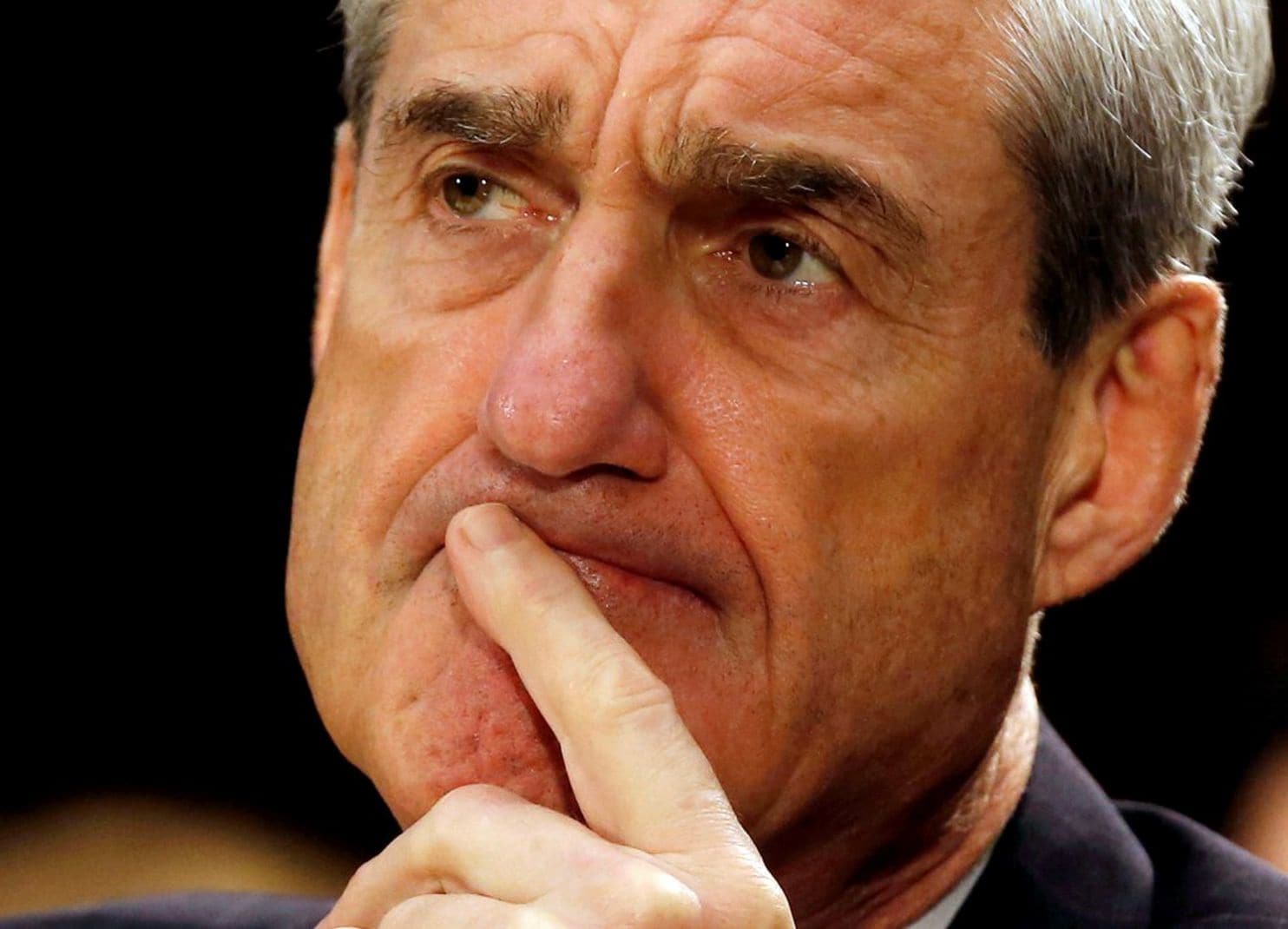

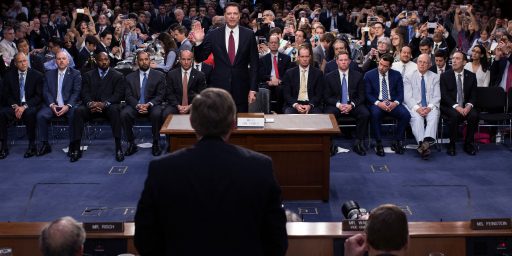
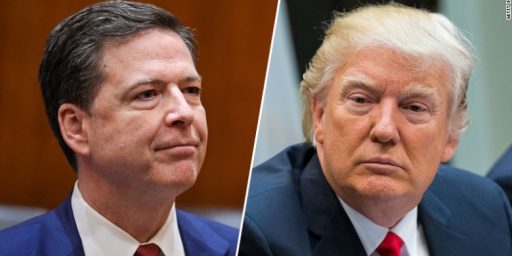
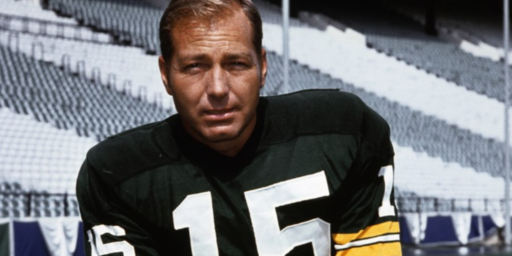
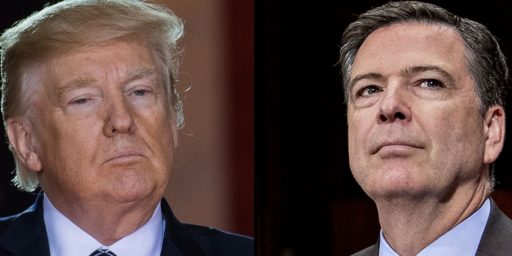
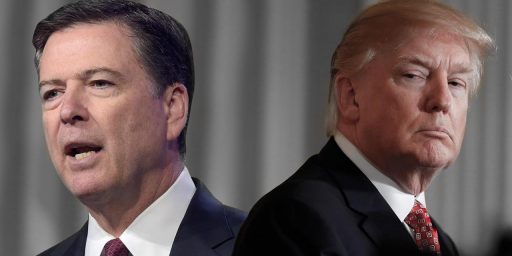
I think it would be a problem if there were no big indictments and no report. The polarization in this country would get worse, with Democrats thinking that Trump was guilty as hell but not quite indictable, and Republicans calling it an exoneration.
I want Trump and his campaign to be exonerated — I want him to be a foolish and useless American rather than a Russian puppet. I don’t think they will be exonerated.
Here’s to learning a lot from Mr Mueller.
@Gustopher:
Of course he could be a foolish and useless American AND a puppet…maybe a guy that combs his hair that way isn’t smart enough to actually collude, and is simply being manipulated by Putin. Maybe President Dennison is being played. That’s all. Even if so, that doesn’t mean there wasn’t any corruption going on, and it doesn’t mean he hasn’t obstructed justice.
Nah. Not buying it. We get real-time leaks from the highest levels of the White House. The FBI and intel communities also manage to let us know where they see things. Granted Mueller is close-mouthed and hasn’t leaked worth a damn, but that discipline will disintegrate in the end and we’ll see it all spilled out in the media. There will be clerks and techies who have access to Mueller’s trove of documents. How many milliseconds did it take us to get the full text of the dossier?
In any case, it’s moot. Obstruction of justice has been played out openly. A chimpanzee could convict Trump of obstruction. And that’s just the start.
It seems clear that Trump is somehow beholden to or under the thumb of Putin. This may, as is generally speculated, flow from money laundering. Or it could simply be that Trump buys into alt right nonsense about Russia being a natural western, Christian bulwark against the Muslim hordes. Or it could be that Trump sees Putin as a role model and ally for profitable autarchy. Whatever the reason, this should have been disqualifying as a candidate and grounds for impeachment as President. Putin has clearly chosen to be at war with us whether Trump chooses to see it or not. If Mueller finds no criminal explanation for Trump’s behavior, I would hope he would still, at minimum, report to Congress whatever reasons he does find.
@michael reynolds: I fear that an obstruction charge by itself, without an underlying, blatant smoking gun crime, won’t convince the base, and won’t lead to congressional action. And I regard it as entirely possible individuals in the campaign colluded without telling Trump. Nix, the Cambridge Analytica/SCL guy said in the British videotape that the candidates are always puppets. Why would the Mercers tell someone with a loose mouth like Trump what they were doing?
@gVOR08:
I can certainly envision the possibility that there was collusion, but Trump didn’t know about it. As you say, why would anyone trust a stupid, impulse-driven, blabber-mouthed narcissist to keep a secret of that magnitude?
Do I believe that Trump would obstruct justice? Launder Russian money? Kowtow to Putin and in so doing sacrifice the best interests of the United States? Absolutely.
@gVOR08:
Exactly.
The base will write it off as collateral damage of an investigation that was bogus to begin with.
@michael reynolds:
Precious few chimps in the US Senate, alas.
If Trump isn’t guilty of something, then he’s even more of a moron than I thought. The question is whether he’s guilty enough for the GOP Senate to remove him. At this point, I think not.
@CSK:
Assuming Trump is guilty of some serious crime, he has managed to keep it secret. Therefore he might have colluded with the Russians and kept it secret as well.
Or else he’s the biggest moron ever to be elected to high office. And I already joke that if Trump’s brains were dynamite, he couldn’t blow his nose.
@Kathy: But these special investigations should definitely have a time limit, like nine months. The special investigator should be chosen by some independent group that are not members of Congress or politicians. There have been major investigations that took a lot less time. (Booth conspirators was less than a year)
@Tyrell: You chose an unusual example for the value of time limits. Was Dr. Samuel Mudd a conspirator or someone railroaded by a rush to judgement? Perhaps, a methodical approach would be better. I believe that careful, meticulous investigation requires time. I want the right answer, not the fast one. Now, obviously things can go too far; Ken Starr went far afield, and eight or nine Benghazi panels seem too much.
@Tyrell:
The problem with putting a time limit on investigations, special or otherwise, is that many investigations take years to be completed.
@CSK:
That’s one problem. The big one, along with the many faults of quick investigations.
Another is that various guilty parties only need to hold out a few months and that would be that. You’d be better off simply granting immunity to everyone in exchange for information.
@Slugger: I agree with all of that. The Booth conspirators case was quick, but was carried out by a military court, which itself is very questionable. The defendants were not allowed to testify. Some evidence was not allowed.
@gVOR08: No Congressional action will come from a Republican Congress whose constituency favors Trump by 80%. Likewise, any Congressional action that comes from a Democrat-controlled Congress will be denounced by the previously mentioned constituency as a partisan witch hunt. The truth might make us free, but it may not make us any wiser. Probably not, in fact.